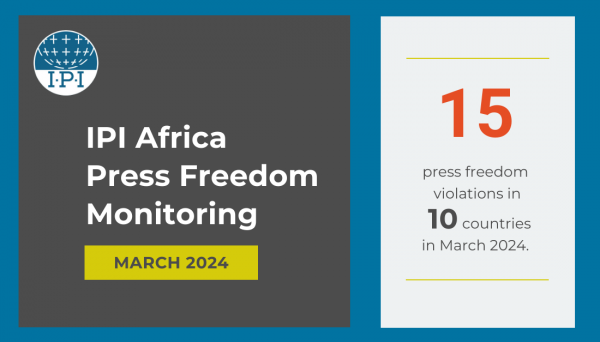The International Press Institute (IPI) and members of the Institute’s Nigerian National Committee today condemned a string of recent attacks against the press and called on the Nigerian police and the state prosecutor to fulfil their duties by punishing those responsible. The apparently targeted killings of two journalists this year underscore the urgency with which the government must tackle impunity.
“The Nigerian government must send the message that people will not get away with assaulting journalists,” said IPI Executive Director Alison Bethel McKenzie. “We call on the police to investigate every case in which a journalist has been assaulted or harmed.”
On August 12, Tunde Ogundeji, a photographer and former photo editor for Compass newspaper, was attacked “by thugs purportedly from the Nigerian Railway Corporation (NRC)” while photographing passengers at a Lagos area train station, according to Leadership newspaper. The paper reported that the journalist had his camera seized and was attacked with “planks and bottles” before a “good Samaritan” intervened.
Benedict Uwalaka, a photojournalist for Leadership newspaper, was battered on Aug. 9 by a group of workers at the mortuary of Lagos State University Teaching Hospital (LASUTH) and had to be hospitalized, reports said. Uwalaka was at the morgue to report as the bodies of victims of a recent plane crash were transferred to their relatives. But as he approached the area, he was attacked by a group who took his camera and beat him with sticks and various objects, including a bottle, Uwalaka said in an interview with his newspaper.
The Nigeria Union of Journalists (NUJ) is reportedly taking legal action against LASUTH. The organization’s Lagos State chapter is also planning a demonstration to “condemn incessant harassment and brutalisation of journalists in Lagos”, according to a press statement. The LASUTH management has denied responsibility but have launched an internal investigation, the Daily Trust reported.
A statement from IPI’s Nigeria chapter, sent by Secretary Raheem Adedoyin, said: “We condemn the unprovoked attack. It is barbaric and senseless. We welcome the NUJ judicial action but we also call on the relevant government agencies to prosecute the offenders and pay compensation to the victim. We also urge journalists not to be deterred in their professional work by this unfortunate incident.”
Last week, on Aug. 7, a branch office of NUJ located in the Delta region was raided by a number of “youths claiming to be ex-militants”, according to a report of the raid sent to IPI by NUJ’s Delta State Chairman Norbert Chiazor.
The group was reportedly holding a demonstration because they had allegedly failed to receive a monthly stipend granted as part of an amnesty program for former militants. However, they became agitated at the lack of media coverage. NUJ said that a reporter from the only TV crew on the scene was told he had “30 minutes to mobilize other journalists […], failure to which they threaten to torch the unions building.”
After the deadline had passed but more film crews had not arrived, the thugs broke one set of sliding doors and threatened to burn the office down with a “keg of fuel”, NUJ reported. A group of soldiers eventually arrived and later arrested two leaders of the group, NUJ reported. The building was not burnt down, though two journalists who were on the scene were assaulted.
“We are glad to hear that arrests were made in the case of the attack against the NUJ building in Warri, Delta State,” Bethel McKenzie said. “We condemn in the strongest terms the attack on the building. Efforts by these protestors to blackmail journalists into covering their event are not only counterproductive, they were violent and wrong.”


